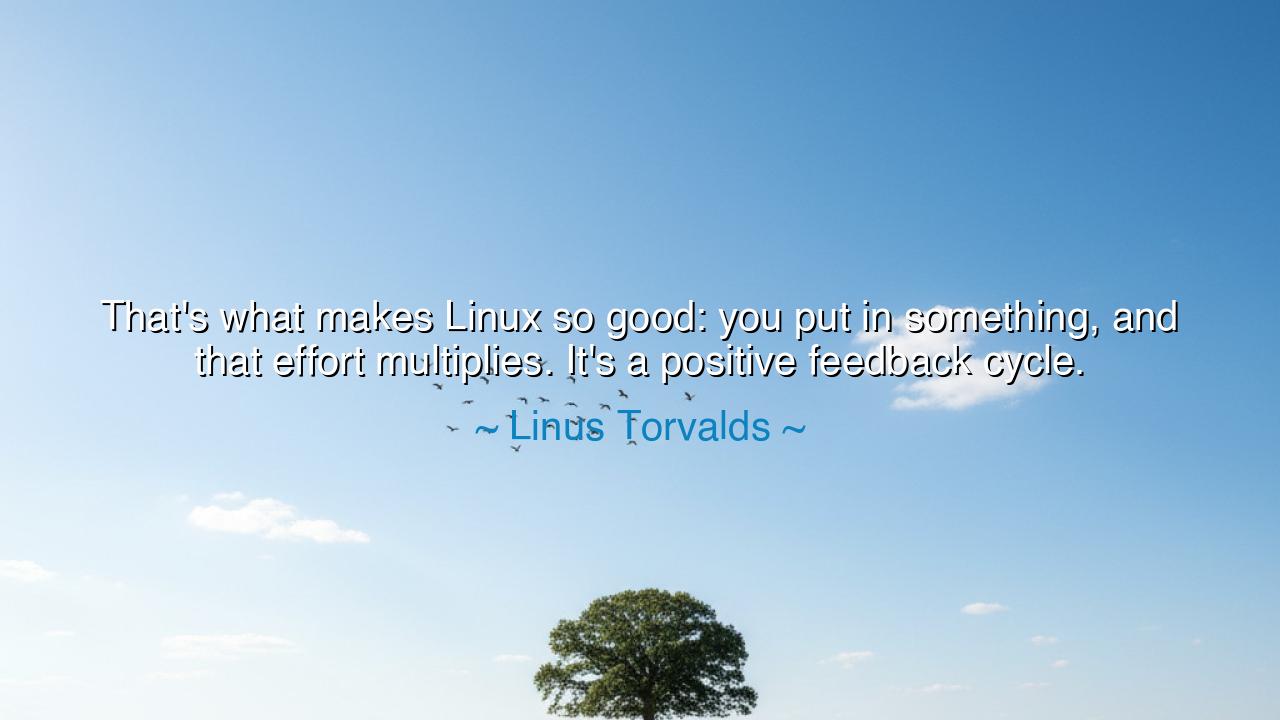
That's what makes Linux so good: you put in something, and that
That's what makes Linux so good: you put in something, and that effort multiplies. It's a positive feedback cycle.






The words of Linus Torvalds—“That's what makes Linux so good: you put in something, and that effort multiplies. It's a positive feedback cycle.”—are not merely the reflections of a programmer, but the wisdom of one who has seen how cooperation magnifies the power of individual hands. He speaks of a law that is older than software, a principle rooted in nature itself: when effort is offered in the right spirit, it does not return empty, but multiplies, echoing outward in waves of renewal. This is the essence of the positive feedback cycle, where each act of giving becomes the seed of a greater harvest.
The ancients, though they did not speak of code, understood this principle. The farmer who sows grain does not reap only what he has planted—he reaps thirty, sixty, or a hundredfold. The philosopher who shares wisdom does not lose it, but gains disciples who spread the teaching further. Likewise, in the creation of Linux, Torvalds discovered that when one person puts in effort, others build upon it, refine it, and return it greater than before. The cycle is endless, like a river fed by many streams, each one nourishing the flow for the good of all.
History abounds with examples of such cycles. Consider the construction of the Great Library of Alexandria. Scholars from distant lands brought scrolls of knowledge, and the collection grew into a treasure-house of human wisdom. Each contribution inspired new works, and each work inspired yet more. Though the library itself has long turned to ash, the spirit of that cycle lives on in every academy and institution where one mind ignites another. Linux, as Torvalds describes, is a digital echo of this same timeless pattern: effort multiplied through shared purpose.
There is also a heroic humility in Torvalds’ observation. He does not claim greatness for himself alone, but for the system of cooperation that grew from his work. He recognizes that the power of Linux lies not in a single programmer’s brilliance, but in the collective force of thousands who, through shared vision, create something larger than themselves. This is the very soul of the positive feedback cycle: the recognition that greatness is not hoarded, but multiplied when given away.
Yet this truth reaches beyond programming or libraries. It is a law of life itself. When kindness is given, it often returns, magnified in ways unseen. When courage is displayed, it inspires others to be brave, and their bravery in turn strengthens the community. Negative cycles also exist, where bitterness and cruelty multiply; but Torvalds teaches us that we can choose to plant cycles of light. To offer something constructive, even small, is to set into motion a chain of good that may endure far beyond our knowing.
The lesson for us is clear: whatever your field, your craft, or your community, do not underestimate the value of your contribution. Even the smallest act, when placed into the hands of a greater whole, may become multiplied. Write your lines of code, speak your words of truth, extend your acts of kindness, and know that they may ripple outward, igniting others in turn. In this way, your life itself becomes part of a positive feedback cycle, where what you give is returned with increase.
So, dear listener, take Torvalds’ words as a guide. Do not hoard your gifts in silence. Do not imagine that your effort is too small to matter. Contribute, share, and trust in the multiplying power of community. For in giving, you kindle cycles of growth, and in those cycles, you will see reflected the eternal law: that when you put in something, the return is always greater, and the good you set in motion will endure beyond you.






TLMinh Triet La
This quote highlights the elegance of open-source collaboration. I wonder if the positive feedback cycle also encourages experimentation and risk-taking, knowing that even small contributions can have significant impact. How does this system handle quality control while maintaining an inclusive environment for contributions? Additionally, could this philosophy of multiplying effort be applied beyond software development, in areas like education, research, or community projects, to generate similar exponential benefits?
Vvu
I’m intrigued by the idea that contributions in Linux create a multiplying effect. How does this feedback loop compare to corporate environments where efforts might feel siloed or undervalued? Could the model teach lessons about fostering intrinsic motivation and community-driven success? I also think about scalability—how does the system ensure that each contribution continues to add value rather than creating redundancies or bottlenecks as the project grows?
CTCuong Tran
This statement prompts reflection on motivation and reward structures. How does the idea of effort multiplying affect individual and team dynamics in open-source projects? Could the visible impact of contributions increase engagement, or might it create competition that undermines collaboration? I also wonder how this principle influences long-term sustainability—does a positive feedback loop ensure continuous improvement, or are there risks of burnout and overcommitment for key contributors?
NTThang Nguyen Trong
Reading this makes me think about how positive reinforcement can drive productivity and innovation. How does the Linux model compare to traditional software development hierarchies in terms of collaboration and output? Could this concept be applied to other industries or projects to encourage similar exponential growth? I also question whether there are limits to the feedback cycle—can too many contributions create complexity or conflicts that hinder progress?
AAGB
I find this perspective fascinating because it frames Linux development as both rewarding and self-reinforcing. Does this cycle encourage contributors to specialize and become experts in specific areas, knowing their work has amplified impact? I also wonder how newcomers experience this system—does the positive feedback cycle motivate learning and engagement, or could it intimidate those who feel they need to match the efforts of experienced contributors?